Her Cardboard Lover

Brief Synopsis
Cast & Crew
George Cukor
Norma Shearer
Robert Taylor
George Sanders
Frank Mchugh
Elizabeth Patterson
Film Details
Technical Specs

Synopsis
Songwriter Terry Trindale has a serious crush on Consuelo Croyden, a woman he sees every night at a Palm Beach casino. Despite his bribes to be seated next to Consuelo, Terry has never approached her and is running out of money. One night, though, he finally blurts out that he loves her. Seeing her shock, he is at first embarrassed but then asks if she could ever fall in love with him. She firmly says no and advises him not to cling so if he wants a woman to return his love. After Consuelo goes to the gambling tables, Tony Barling arrives, but because he is not in evening clothes he cannot enter the casino. When Terry learns that Tony wants to give a note to Consuelo, he volunteers to take it to her, but as soon as Tony leaves, he tears it up. Terry then watches the melancholy Consuelo win at chemin de fer and becomes so enraptured that he yells out "Banco" to play against her. After she wins again, he accrues a $3,200 gambling debt to her. He pleads poverty, and she feels sorry for him, but when he gives her the pieces of Tony's note, she becomes very flustered and asks him to reassemble it. She then requests that he come to her house and declares that she will hire him as her secretary to work off the debt over the next ten weeks. Explaining that his duties will be to assume the role of her "cardboard lover," she asks for his written promise to pretend to be her fiancé, then explains that Tony is her former fiancé, with whom she broke off because of the madness of their love-hate relationship. She demands that Terry always come between Tony and herself and orders him to prevent her--at any cost--from going to Tony. Just then Tony drives up to her house and Consuelo asks Terry to hide on the patio. Although she is cold to Tony, he does not believe that she now loves someone else. Terry then comes in, acting very affectionate and possessive. Tony recognizes him from the casino and is suspicious, and when Terry goes to get ice, Tony tells Consuelo that he knows this is an act and begs her to come to a friend's yacht before they sail in the morning. After Tony leaves, Consuelo dismisses Terry and quickly packs her bags to meet Tony. Terry is waiting at her front door, though, reminding her of her own words, "And if I try to go to him, hold me back." Four weeks later, Terry is still on duty, much to the delight of Consuelo's maid Eva, who hates Tony, but Consuelo continues her fruitless quest to shake Terry. Even Chappie Champagne, Terry's partner, cannot convince him to come with him to New York to sell their new song, "I Dare You," which they have been composing on Consuelo's piano. After Chappie leaves, she pretends that she is cured of Tony and offers to cancel the rest of Terry's debt so he can join Chappie. Terry then leaves, saying he is going to the airport. A few moments later, Consuelo gets a call from Tony saying that he is going away, but she convinces him to come to her house and sends the disgusted Eva to bed. Strangely, Tony asks her to change her dress, wear a negligee and unlatch the door for him. She then waits, but it is Terry who arrives, admitting that it was he who called, disguising his voice to sound like Tony, and then says that he now realizes she would throw away all self-respect for Tony. When Tony actually does arrive, she makes Terry hide and tells Tony that Terry is not really her lover. At that moment, though, Terry comes out of her dressing room wearing her satin pajamas and gets into bed. An embarrassed Consuelo tries to make Terry tell the truth, but he refuses and Tony leaves. When Terry goes to change, Consuelo locks him in the bathroom, but he has already left and is waiting in the hall. She slaps him, but he again reminds her of her instructions to keep her from Tony at any cost. During an argument, Consuelo says that his songs are "tripe," but soon apologizes and admits that she is hopelessly in love with Tony. When even her offer of a kiss will not dissuade Terry, she simply calls Tony and says she has kicked Terry out and is leaving immediately to see him. Terry then threatens to jump out the window, but his plot is unsuccessful. Finally Terry goes to his hotel, where Tony is also staying. After meeting in the elevator, the two men begin a wild fight, which is eventually broken up by the police. During their hearing on charges of disturbing the peace and assaulting a police officer, Consuelo shows up very angry with Terry, but when Chappie arrives with tickets to New York and money from the sale of their song to pay for Terry's fine, she begins to realize her true feelings. After Tony finally proposes to her, Consuelo suddenly realizes that she no longer loves him, but Terry. She goes after Terry but he refuses to stop and heads to the airport, where he is arrested on a charge of grand larceny. In court, Consuelo comes forward and admits that she invented the charges because she had to stop Terry from leaving. Finally, realizing that they are both in love, Consuelo and Tony kiss.

Director

George Cukor
Cast

Norma Shearer

Robert Taylor

George Sanders
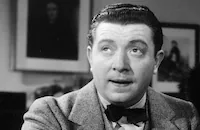
Frank Mchugh
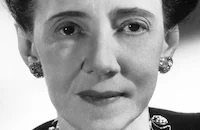
Elizabeth Patterson
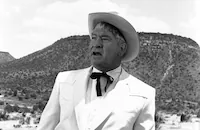
Chill Wills
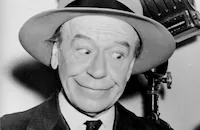
Donald Meek
Jill Esmond

Roger Moore
Bud Jamison
Frank Elliott
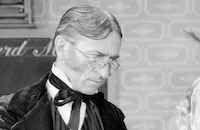
Olin Howland
Richard Crane
Arthur Loft
Ottola Nesmith
Winifred Harris
Alec Craig
Dudley Dickerson
Tom Herbert
Johnnie Berkes
Rex Evans
Gertrude Short
Ben Carter
Dick Rich
Fred Kelsey
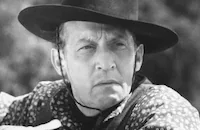
Raymond Hatton
Louis Mason
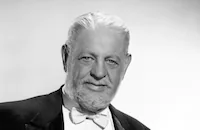
Thurston Hall
Harry Hayden
Heinie Conklin
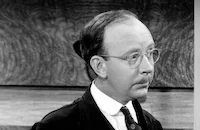
Hobart Cavanaugh
Florence Shirley
Crew
John Collier
Jacques Deval
Randall Duell
Ralph Freed
Cedric Gibbons
Kalloch
Robert J. Kern
Burton Lane
Harold Marzorati
Jack Moore
Robert Planck
Arthur Rose
J. Walter Ruben
Douglas Shearer
Harry Stradling
Anthony Veiller
Franz Waxman
Edwin B. Willis
Edward Woehler
William H. Wright

Film Details
Technical Specs

Articles
Her Cardboard Lover
Twenty-two years earlier, Edith Norma Shearer was eking out a living using whatever god-given talents and the make-up palette could provide. Author Jane Ellen Wayne describes the actress in The Golden Girls of MGM, "In spite of a cast in one eye, lack of facial bone structure and a stubby figure, she personified glamour through sheer determination. She was not a great actress but she learned the tricks of the trade and used them to her advantage." Signed to MGM by her future husband and studio wunderkind Irving Thalberg in 1923, Shearer appeared in the Lon Chaney classic silent He Who Gets Slapped (1924), but after her 1927 marriage to Thalberg, she had her pick of the scripts. (During the engagement, a frustrated Crawford lamented, "What chance do I have? She's sleeping with the boss.") Shearer had a total of five Oscar® nominations for Best Actress and one win, for The Divorcee (1930). George Cukor had directed her in Romeo and Juliet (1936) and The Women (1939), with Crawford in second billing. When Shearer selected the farcical comedy Her Cardboard Lover over Now, Voyager (1942) as her next project, Cukor was tapped again. Irving Thalberg, Jr. was quoted as saying, "I recall my mother's admiration for Cukor, and her feeling that he got top performances from her and many other actors and actresses." Shearer's costar in Escape (1940), Robert Taylor was cast as her love interest and George Sanders as her other love interest.
Cukor had another connection to the production: he had directed the theatre version with Laurette Taylor and Leslie Howard in the 1920's, making his only work to appear on stage and screen. The film rights to Her Cardboard Lover were originally purchased by MGM as a silent vehicle for Marion Davies, long-time paramour of publishing magnate William Randolph Hearst, in 1928. Buster Keaton starred in a talkie version titled Le Plombier Amoureaux (The Passionate Plumber, 1932). The story had its variations, but the basic premise of a woman employing a hired man to pose as her lover in order to dissuade an insistent ex-husband bent on reconciliation remained essentially the same. Timing is everything, and in George Cukor by Gene D. Phillips, the author explains, "By the time the Cukor version came along, however, the Legion of Decency had been formed to rate the moral suitability of films for its Roman Catholic constituency; and the Legion frowned on divorce as a plot ingredient for a film." In the absence of a formal rating system, the Legion of Decency was a powerful force to be reckoned with in those days. As a result, the plot was quickly altered to feature an ex-boyfriend, rather than ex-husband. This change, while seemingly minor, served to undermine the driving action of the film; critics and audiences wondered why a character would go to such lengths to fend off an old suitor.
This plot device, however, was the least of Her Cardboard Lover's concerns. There was an even more critical factor in the lackluster success of the film. Although Cukor readily agreed to helm the film, he later admitted, "But now I wish I hadn't. The plot was already too dated to engage a wartime audience." Indeed, with the United States in the throes of World War II, moviegoers were much more attracted to patriotic dramatic fare like Mrs. Miniver (1942). The film that made a star of Greer Garson was passed on by Shearer, who balked at the thought of playing a middle-aged woman. It was just one more example of a golden opportunity refused by the actress (Now, Voyager was a huge hit for Bette Davis). Even co-star Robert Taylor put it bluntly: "There was a war going on so I had more important things on my mind." The coup de grace was the Queen herself: after over two decades in film, she no longer had the drive or ambition of her youth. Her biography explains, "During Her Cardboard Lover, Cukor had noted that Norma's creative energy was lower than usual. Because he knew how to handle her as an actress, and was personally fond of her, he succeeded in recharging it. She worked at the part, not just at fabricating a youthful image...but 'there were times when she seemed distracted.'" For a woman whose career was defined by drive and determination, it was the end of the road, and for film, the end of an era. She exited quietly and with grace, commenting shortly after the film's opening, "An actress must never lose her ego - without it, she has no talent."
Producer: J. Walter Ruben
Director: George Cukor
Screenplay: Jacques Deval, John Collier, Anthony Veiller, William H. Wright
Cinematography: Robert H. Planck, Harry Stradling, Sr.
Film Editing: Robert Kern
Art Direction: Cedric Gibbons
Music: Burton Lane, Franz Waxman
Cast: Norma Shearer (Consuelo Croyden), Robert Taylor (Terry Trindale), George Sanders (Tony Barling), Frank McHugh (Chappie Champagne), Elizabeth Patterson (Eva).
BW-94m.
by Eleanor Quin

Her Cardboard Lover
Quotes
Trivia
This was Norma Shearer's last movie.
Notes
Working titles of the film included Love Me Not and Slightly Platonic. The onscreen writing credit reads: "Screen Play by Jacques Deval, John Collier, Anthony Veiller and William H. Wright, based upon a play by Jacques Deval, first English Dramatization and Title by Valerie Wyngate, Later Revisions by P. G. Wodehouse." According to news items in Hollywood Reporter, in December 1934 and January 1935, M-G-M's production chief Irving Thalberg had intended to turn Deval's play into a musical starring Maurice Chevalier and Grace Moore. Initially S. N. Behrman was to adapt the script with Ernst Vadja. In February and March 1935, first S. J. and Laura Perelman, then Jack Kirkland were said to be adapting the play following the departure of Chevalier from the project.
Modern sources indicate that Chevalier was angry with Thalberg because he was asked to take second billing to Moore. Aside from providing an English-language prologue and narration to the French-American co-production Man About Town in 1947 (see below), Chevalier did not make another American film until Love in the Afternoon in 1957, and did not make another film in the U.S. until Can-Can in 1960. It is doubtful that the work of Behrman, Vajda, Kirkland, S. J. or Laura Perelman is reflected in the 1942 adaptation of Deval's play.
According to a November 6, 1941 Hollywood Reporter news item, Joan Crawford and Hedy Lamarr each were offered the role of "Consuelo" but turned it down. A March 10, 1942 news item noted that Robert Taylor was making his motion picture singing debut with two songs written by Burton Lane and Ralph Freed. Only one song, "I Dare You," was included in the film, however, and Taylor had sung very briefly in earlier films. According to Irving Hoffman's "Tales of Hoffman" column in Hollywood Reporter, the New York critics were extremely critical of the film, calling it "wasted celluloid." Bosley Crowther of the New York Times cited the film as one of the ten worst of the year. Her Cardboard Lover was the last film of long-time M-G-M star Norma Shearer (1900-1983), the widow of Irving and sister of M-G-M's recording director, Douglas Shearer.
An earlier adaptation of Deval's play (as adapted into English by Valerie Wyngate and P. G. Wodehouse) was released by the studio in 1932 under the title The Passionate Plumber, directed by Edward Sedgwick and starring Buster Keaton, Jimmie Durante and Irene Purcell (see AFI Catalog of Feature Films, 1931-40; F3.3395). A French-language version of that film was also made in 1932 under the title Le plombier amoureux, also starring Keaton, Durante and Purcell, but directed by Claude Autant-Lara.















